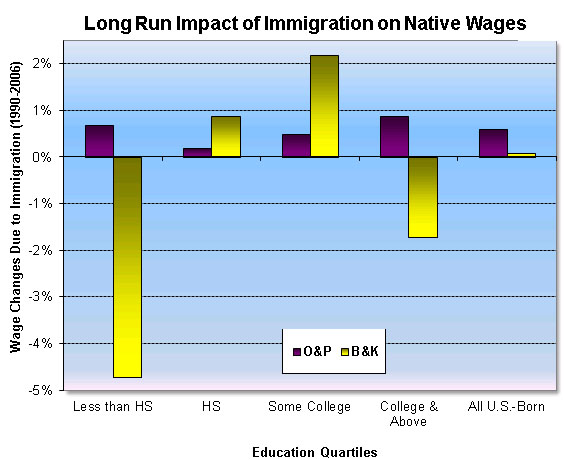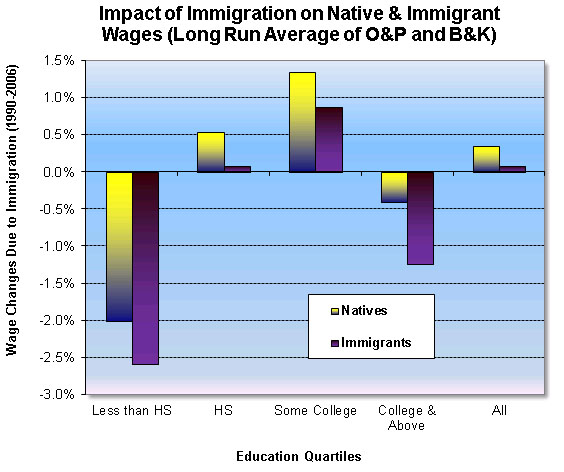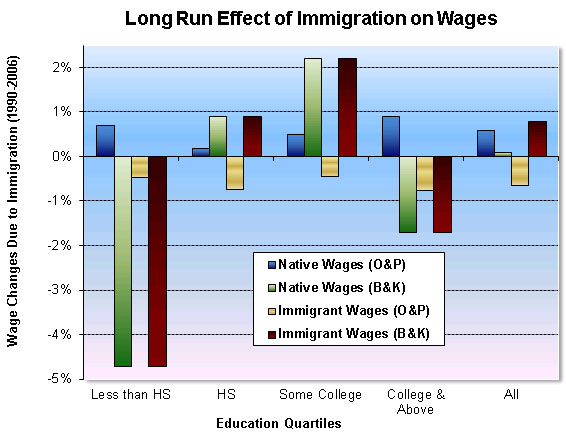Editorial note, added December 26, 2014: Welcome, Hacker News readers! This website is devoted to discussing the case for open borders, including the moral arguments for it and the practical question of how to get there. To address concerns surrounding migration liberalization, we suggest keyhole soutions and slippery slopes to it. For more about the site, you might want to read our site FAQ. Another post that you might find particularly relevant is Nathan Smith’s post on Mark Zuckerberg and FWD.us.
One puzzling thing I notice about debating immigration is how certain people often are that strictly restricting immigration is the right policy. Almost any person, when prompted, can articulate almost immediately a tonne of reasons why restricting immigration makes sense:
- National governments have carte blanche to exclude any foreigner from their territory as matter of moral right
- Open borders would let terrorists into our country
- Open borders would let foreigners steal jobs from our people
- Open borders would allow a foreign people to invade and steal our country from us
- Permitting immigration imposes foreign cultures on our people
- Immigrants will abuse our welfare system
- Immigrants will undermine our institutions and replace them with their inferior ones
- Liberalising immigration won’t really help poor foreigners anyway
- Too many immigrants will swamp our territory or society to the point that it cannot function any longer
- Letting in low-IQ/-skilled immigrants harms our economy or polity
But for some reason, the same people eager to expound on the litany of catastrophic harms that would no doubt ensue under open borders are rarely able to cite any sort of academic literature that backs them up. Their best retort, in terms of academic prestige, is George Borjas’s work on immigration’s impact on American wages, and maybe Robert Putnam’s work suggesting that diversity reduces some theoretical measure of “social capital”. You can’t find any empirical estimates that seriously support the above hypotheses — at least not to the degree that has people so certain the only right immigration policy is building a better and higher prison wall.
Now, if you turn the above propositions around, on all of them, we are either certain that open borders is immensely beneficial, or we’re just unsure. We know for a fact that liberalising immigration immensely helps the poorest human beings alive. Hardly any serious restrictionist disputes this; the only ones I’ve encountered who do are basing their certainty on foundations of sand: the most memorable example was a person who suggested that estimates of the place premium are wrong, because when you adjust for purchasing power parity, people in poor countries have better living standards than people in the US — such an economically-illiterate claim that it doesn’t even merit a rebuttal here. Most restrictionists are happy to concede that immigrants are made better off — they just believe that the act of immigrating makes natives dramatically worse off.
But the propositions to do with crime and “job theft” are our runners up for certainty: in the empirical literature, it’s difficult to find any serious social scientist who believes immigration increases crime rates, especially in a significant manner. And among economists, Borjas alone sticks out like a sore thumb for producing estimates showing dramatic depression of native wages (“dramatic” being a short-run reduction of a few percentage points). If there are any serious peer-reviewed, published analyses showing immigration leads to a significant spike in crime, or any landmark studies besides Borjas’s contradicting the economic consensus, I’d love to see them, because they seem to have slipped the minds of the restrictionists I’ve met so far.
Still, for virtually all the other propositions above, the evidence is either limited, decidedly mixed, or both. The long-run institutional, political, and societal effects of immigration have not been thoroughly studied in an empirical manner. But assuming we place the most weight on these outcomes (and ignore the other findings on the economics and crime of immigration), this means we ought to be cautiously uncertain about what the right immigration policy is. It means that even if we favour restrictionist policies, we do so with great uncertainty.
Yet the spectre of open borders seems to produce a stout certainty on the part of many people, who even if they aren’t dedicated restrictionists, seem quite convinced that the status quo or something close to it is certainly the right and best policy, given what we know now. There is strong certainty that a more liberal immigration policy of any kind would be a horrible idea. Yet engaging with these pro-status quo or even pro-closed borders assertions, one finds them disappointingly devoid of empirical backing.
The best ace the restrictionists have in their back pocket is the nuanced argument that reducing the proportion of high-IQ people in an economy below a certain percentage, or raising the proportion of low-IQ people in an economy above a certain percentage, would lead to a slowdown in innovation or corrosion of successful institutions. But even this claim is problematic, since it is difficult to tell how far IQ and economic growth and innovation are causally linked. And if having low-IQ immigrants is so devastating, this effect should surely be easy to demonstrate through meaningful measures of harm: slower economic growth rates, fewer number of patents filed per capita, higher crime rate. If we can’t observe these harms at existing levels of immigration — and, it bears repeating, the overwhelming majority of the empirical literature cannot find any such meaningful harms — then right now we are simply worrying about IQ for the sake of worrying about IQ.
If this whole post seems wishy-washy, since I’m essentially conceding that we are uncertain about the effect of open borders on quite a few dimensions, you’re partly right. But it’s more accurate to say that we are just as equally quite uncertain about the impact of closed borders, and to the extent we know anything with certainty, it’s how devastating they are. We can’t even rule out that closed borders are incredibly harmful to us on a number of dimensions (a straightforward reading of the empirical literature suggests that if you want to cut crime rates, you should subsidise immigration). Worse still, given the consistency of the literature regarding the impact of closed borders on the world economy and global poverty, we are absolutely certain that closed borders keep millions of people in poverty of the worst kind. We know that on average, the effect of closed borders halves the world economy.
Even if you think that the status quo of closed borders is right, it is worrying how uncertain we are about this conclusion. In many cases, the issues at hand simply haven’t been studied enough, and we know virtually nothing (we certainly don’t know enough to support most common restrictionist assertions about immigration). We do know the incredible destruction that closed borders wreaks on the world economy and the people of the world, to the tune of halving world GDP and keeping millions in poverty. We ought to have our top men and women working on figuring out whether we can crack the borders open at all. The fact that we don’t means we are simply irrationally certain that closed borders is the right answer. And that irrationality strikes me as best summed up in this 1881 cartoon, depicting Irish immigrants to the US — men and women bringing terrorism, crime, and corrupt institutions to American shores, people whose only contribution was adding themselves to the welfare rolls:
Editorial note: If you’re interested in discussing the many issues related to open borders, check out the Open Borders Action Group on Facebbook.


![ChineseExclusionActHandbill[1]](http://openborders.info/wp-content/uploads/2013/05/ChineseExclusionActHandbill1.jpg)


